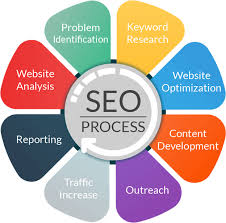In the ever-evolving world of digital marketing, staying ahead of the curve requires leveraging the latest technologies. Artificial Intelligence (AI) has become an indispensable tool for SEO professionals and marketers aiming to optimize their strategies. From keyword research to content creation, AI-powered tools are revolutionizing how businesses approach search engine optimization. In this article, we’ll explore how to use AI for SEO and how it can elevate your efforts to gravitate above the competition.
1. AI-Powered Keyword Research
Keyword research is the foundation of any successful SEO strategy. AI tools like SEMrush, Ahrefs, and Google’s Keyword Planner have taken keyword discovery to the next level.
- Benefits of AI in Keyword Research:
AI tools analyze search trends, competitor strategies, and user intent to recommend high-ranking and long-tail keywords. They identify semantic keywords, which help content rank for multiple search queries. - Example: Tools like Surfer SEO or Clearscope use AI to suggest the most relevant keywords to include in your content, enhancing its ranking potential.
By leveraging AI-driven keyword research, businesses can uncover niche opportunities, create relevant content, and attract the right audience.
2. Optimized Content Creation with AI
Content is king, and AI is the master craftsman. AI tools like ChatGPT, Jasper, and Writesonic have made it possible to create high-quality, engaging content quickly.
- AI for Content Writing:
AI helps generate blog posts, product descriptions, and meta tags based on targeted keywords. It also provides suggestions for tone, readability, and structure to ensure the content appeals to your audience. - Content Gap Analysis:
AI tools like Frase and MarketMuse analyze existing content and highlight gaps, enabling marketers to address unanswered questions or cover topics that competitors have missed.
AI doesn’t just create content—it ensures the content is relevant, optimized, and aligned with user intent.
3. Enhanced On-Page Optimization
AI excels at analyzing on-page elements such as titles, meta descriptions, headers, and alt text.
- How It Works:
AI tools like Surfer SEO and RankMath assess your page’s structure and provide recommendations for optimization. This includes improving internal linking, optimizing keyword density, and enhancing content readability. - Real-Time Adjustments:
AI algorithms continuously monitor changes in search engine algorithms and suggest updates to keep your content ranking high.
This ensures that your web pages are always in sync with the latest SEO best practices.
4. Voice Search and AI Integration
With the rise of voice-activated devices, optimizing for voice search has become essential. AI helps in understanding conversational language, which is crucial for voice search queries.
- Voice Search Optimization:
AI tools analyze how people phrase queries when speaking. For instance, instead of “best pizza New York,” voice search users might ask, “Where can I find the best pizza in New York?” - AI-Powered Schema Markup:
AI can help implement schema markup, making it easier for search engines to understand your content and increasing the chances of appearing in voice search results.
Incorporating AI-driven insights into your strategy can boost your visibility for voice-based searches.
5. AI for Competitive Analysis
Understanding your competition is crucial for staying ahead. AI tools like SpyFu, SimilarWeb, and SEMrush allow businesses to monitor competitors’ strategies.
- Features of AI in Competitive Analysis:
AI identifies keywords your competitors rank for, backlinks they’ve acquired, and the types of content they create. - Backlink Opportunities:
Tools like Ahrefs use AI to recommend websites for potential backlinking based on competitors’ profiles.
AI-driven competitive analysis ensures you’re always one step ahead in the SEO game.
6. Predictive Analytics for SEO
AI’s ability to analyze large datasets enables predictive analytics, which can forecast future trends and user behavior.
- Benefits of Predictive Analytics:
AI tools like BrightEdge and Conductor predict shifts in search engine algorithms, keyword trends, and user preferences. - Data-Driven Decisions:
These insights allow marketers to make proactive adjustments to their strategies rather than reacting to changes after they occur.
By leveraging predictive analytics, businesses can prepare for future challenges and capitalize on emerging opportunities.
7. Automation of Repetitive Tasks
AI significantly reduces the manual workload by automating repetitive SEO tasks.
- Automation Examples:
- Generating XML sitemaps
- Analyzing website performance metrics
- Monitoring backlinks and identifying broken links
- Automating social media sharing of content
- Tools for Automation:
Platforms like Screaming Frog and HubSpot utilize AI to automate these tasks, allowing marketers to focus on more strategic activities.
This not only saves time but also ensures efficiency and accuracy.
8. Improved User Experience (UX)
Search engines prioritize websites that deliver a great user experience. AI helps optimize UX by analyzing user behavior and providing actionable insights.
- AI Tools for UX Optimization:
Tools like Hotjar and Crazy Egg track user interactions, such as clicks, scrolls, and time spent on pages. AI then suggests improvements to enhance engagement. - Page Speed and Mobile Optimization:
AI tools like Google PageSpeed Insights identify elements slowing down your website and recommend fixes.
A seamless user experience leads to higher engagement, lower bounce rates, and improved rankings.
Conclusion
AI is transforming the SEO landscape, offering tools and techniques that simplify processes and deliver superior results. From keyword research to user experience optimization, AI empowers marketers to make data-driven decisions, save time, and outperform competitors.
By integrating AI into your SEO strategy, you can gravitate your online presence to new heights, ensuring your business remains competitive in an ever-changing digital landscape. Embrace the power of AI today and witness the difference it makes in driving traffic, boosting rankings, and achieving your SEO goals.

